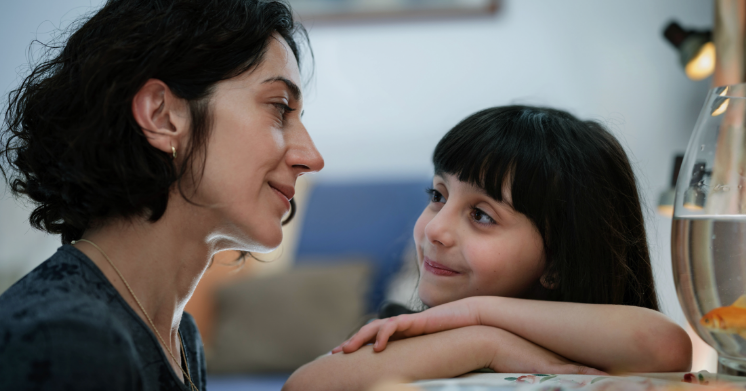TIFF '23: Zar Amir Ebrahimi mesmerizes as "Shayda"
 Saturday, September 16, 2023 at 2:42PM
Saturday, September 16, 2023 at 2:42PM  "Shayda" is coming to US theaters on December 1st from Sony Pictures Classics.
"Shayda" is coming to US theaters on December 1st from Sony Pictures Classics.
Though I've hardly been running after Oscar contenders while at TIFF – apologies if that's what you wanted out of this coverage – the Best International Film race remains at the forefront of my mind. With new daily announcements, the festival's an excellent opportunity to catch some titles that could be hard to track down later in the season. So, a lot of my scheduling has been built around productions that might end up in that race or have already been confirmed for the 96th Academy Awards. Not all of the experiences are positive, but a few of them are revelatory.
Such is the case of Noora Niasari's feature debut, Shayda, representing Australia. If you thought Zar Amir Ebrahimi was remarkable in last year's Holy Spider, wait to see what she does here…
In 1995, Australia, a little girl is walked through the airport by her mother and another strange woman, full of urgent advice and instructions about what she must do if her father brings her there. Shot in Academy ratio from the kid's point of view, these opening moments set a discomfiting tone for Shayda, dropping us in the middle of a separation that has already turned ugly – in some ways, this story starts where other films would end, the moment of escape. When we find them, mother and daughter are on the run, seeking a haven at a women's shelter in the Brisbane suburbs while the man in their lives appeals to a judge.
Context is given in offhand comments and behavioral clues, the adults' anxiousness contrasted with the youth's confusion. Not that Shayda will continue to privilege Mona's experience above that of her mom, for whom the film is titled. Soon enough, Niasari lets the camera detach from the girl's limited scope to pursue a woman's fight for freedom, for a life lived with security, outside the shadow of an abusive husband. When he re-enters the picture, granted unsupervised visits with Mona, the situation only becomes more hellish for Shayda, who spends her days recounting marital strife as part of her casework.
Through her complicated gaze, we discover this new phase in the family's life, a new home. The shelter reveals itself as a space where loneliness should be impossible, every space shared and every possession owned by the collective. And yet, isolation prevails in our understanding of the characters' plight. Part of it is the fraught situation, escaping from domestic abuse and trauma with a small daughter who doesn't understand the specificities of what she's running away from. Another facet is, of course, xenophobic pressure baring down on the mother, snide comments, and micro-aggressions, a bitter reality of everyday life away from her community.
As you might have surmised, Shayda and Mona come from an immigrant background, their origins in Iran, where the girl's father wants to relocate the family. Because, of course, he will have a judicial advantage back there, guaranteeing his wife's punishment in the eyes of the law. One could read an anti-Iranian sentiment in the plot if not for how much Shayda remains attached to her roots, celebrating Persian New Year with Mona, to whom she lovingly explains every ounce of cultural symbolism and rite. Since they're in the Southern Hemisphere, what should be a celebration heralding spring vitality settles for the decay of autumn, naked trees, and blankets of red leaves instead of flowers.
This sort of details add a level of visual sophistication to the storytelling qualities. Though there's the usual doom and gloom of indie drama via the naturalistic light and loose camerawork, there's also astute color disruptions at specific points. Argento red for violence is twinned with the scarlet of lifeforce on Mona's hat, while a pop of blue at the end signals nascent peace gilded with hope. Moreover, the cutting is rather sharp at the micro-scale, knowing how to evoke elation and asphyxiation with equal aplomb. It knows to break a close-up monologue with the perfect glimpse of a trembling foot under the table. The film is less well-paced at the macro level, but so is life.
All that said, Shayda is a character study doing double duty as a daughter's reckoning with who her mother was – much of it is semi-autobiographical. And so, the leading lady's work tends to take precedence over the rest, a crushing responsibility that might have defeated a lesser actress. For her part, Zar Amir Ebrahimi stuns as both the maternal mirage perceived through her daughter's eyes and as the survivor who won't give up. A whisper of tenderness overlaps with the grip of terror almost every step of the way.
There are so many details from the Iranian Cannes champion that can take your breath away. A few favorites include the chant-like repetition of "I am not afraid," convincing herself and others while teaching the audience how to read her character. There's also the softness with which Shayda contemplates an impulsive haircut or the nerve-wracking visit to a Persian grocery shop where the walls have ears. Every scene with the husband is a straight shot of depurated stress, making you nauseous with apprehension. An account of marital rape would be the actress' Oscar clip in a world where these kinds of movies could get traction. The suggestion of immigrant sisterhood, regardless of origin, slashes light through Shayda's general sorrow. We're reminded that there's light at the end of the tunnel. So keep going, don't give up.


